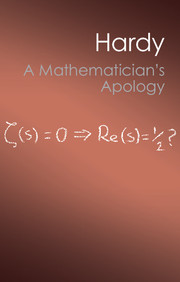Summary
I had better say something here about this question of age, since it is particularly important for mathematicians. No mathematician should ever allow himself to forget that mathematics, more than any other art or science, is a young man's game. To take a simple illustration at a comparatively humble level, the average age of election to the Royal Society is lowest in mathematics.
We can naturally find much more striking illustrations. We may consider, for example, the career of a man who was certainly one of the world's three greatest mathematicians. Newton gave up mathematics at fifty, and had lost his enthusiasm long before; he had recognized no doubt by the time that he was forty that his great creative days were over. His greatest ideas of all, fluxions and the law of gravitation, came to him about 1666, when he was twenty-four—‘in those days I was in the prime of my age for invention, and minded mathematics and philosophy more than at any time since’. He made big discoveries until he was nearly forty (the ‘elliptic orbit’ at thirtyseven), but after that he did little but polish and perfect.
Galois died at twenty-one, Abel at twenty-seven, Ramanujan at thirty-three, Riemann at forty.
- Type
- Chapter
- Information
- A Mathematician's Apology , pp. 70 - 73Publisher: Cambridge University PressPrint publication year: 2012



